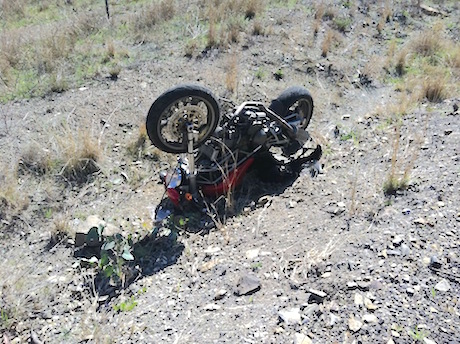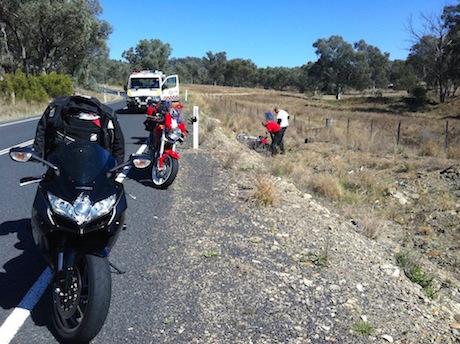First Aid for Motorcyclists principal instructor Roger Fance tells how his wife’s run-in on her Ducati Monster with a wallaby was one catalyst for their specialised motorcycle first-aid course.
The wallaby came out of nowhere and jumped straight into the front wheel of Tracy’s motorbike.
The morning was crisp and bright as we rode through the Bylong Valley on a glorious spring day. About 1km earlier, we had stopped while Tracy tucked her neck warmer under her helmet straps and cinched her helmet tighter. No idea of the chaos to come.
I knew it was bad. Tracy was slammed down on to the road like she had fallen from a five-story building. The bike cartwheeled as shrapnel filled the air. The wallaby was catapulted across my path. My bike’s momentum carried me through as I lost sight of Tracy tumbling down the road to my left. A sense of dread consumed me as I hit the brakes, jumped off the bike and ran back to my wife.
Her injuries were serious but not life-threatening. She was wearing full leathers and her skin was saved. She was moving her legs but her collarbone and wrists were clearly broken. Later, we would find out she had 14 breaks to her ribs and had a partially collapsed lung. We were a long way from anywhere but there was a phone signal and a first-aid kit. It would take one hour for an ambulance to reach us and another hour for the helicopter to air lift her out.
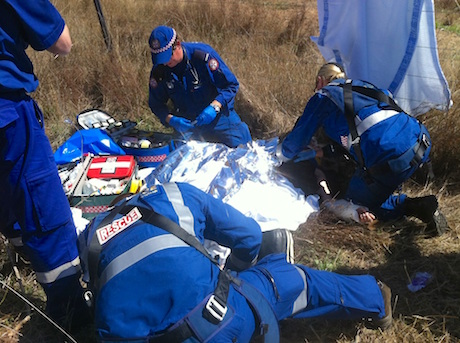
A few years earlier, Tracy was at the scene of a friend’s motorbike accident. A ute made an unexpected right turn into a fire trail. The rider lay on the road semiconscious and not breathing normally; his airways were swelling and it was clear something had to be done and fast. He had been leading a large group so there were many riders at the scene, all with their own ideas of how it should be managed, especially around the question of helmet removal. Uncertainty about what to do, combined with the shock of such a high impact collision, made it a long anxious wait for the paramedics and helicopter to arrive.
Seeing first-hand how critical it is to have good first-aid skills and act decisively at an accident scene inspired Tracy to become a Senior First Aid Instructor for St John Ambulance.
Being an experienced trainer and a keen rider, she began to realise that a standard first-aid course didn’t go anywhere near covering the vital things motorcyclists need to know. Riders weren’t learning about accident scene management to reduce danger to themselves and others. They weren’t learning about things that can be done to prevent accidents in the first place or lessen their impact. They weren’t learning about what to do for a rider in a full face helmet who had stopped breathing normally or how to move a casualty if absolutely necessary by themselves. They weren’t learning about what was needed in a first aid kit for a motorbike rider, or the means for effective communication in remote areas.
The catalyst for starting First Aid for Motorcyclists came about when a Sydney motorbike club asked Tracy to deliver training for its members. Knowing she was an accomplished first-aid instructor they provided seed funding for her course.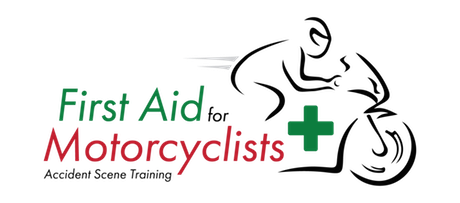
Tracy began the many hours of extensive research needed to develop a half-day session. We weren’t trying to create a standard first-aid course replete with a certificate at the end of it – there are plenty of first-aid course providers. Instead, we were trying to create a punchy course that is directly relevant and information-rich for motorcyclists and the sometimes bad situations in which they find themselves.
Our course includes key elements of a standard first aid course combined with new modules written specifically for motorcycle road-related trauma and accident scene management. The course is endorsed by the Royal Rehab, Ulysses Club Inc, Australian Motorcycle Council, Motorcycle Council of NSW, Stay Upright, H.A.R.T. and Skill Master.
We wanted the course to be as hands-on and as practical as possible. That is why, over a three-and-a-half-hour period, participants are jumping up at regular intervals to learn how to perform CPR on a manikin, to remove a full face helmet safely for a non-breathing casualty, to move a casualty away from danger and to manage bleeding, burns, breaks and shock. Students learn how to do all these things in the worst-case scenario of being alone.
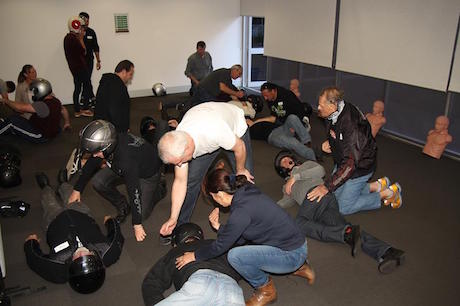
Learning is enhanced by videos that demonstrate how to pick up a motorbike if necessary, how to manage an accident scene to avoid other road users causing further danger and injury and how to perform hands-only CPR if helmet removal isn’t an option. Students also take part in accident scenarios and discussions, collaborating and sharing ideas on how to best manage an incident, they learn about basic accident prevention and how to create and abide by group riding rules such as a buddy system and a pre-ride briefing to enhance communication and safety.
For the past 18 months, First Aid for Motorcyclists has primarily delivered this training at the Royal Rehab in Ryde which provides specialist rehabilitation for people who have experienced injury or illness that results in temporary or permanent disability such as stroke, brain injury and spinal cord injury. Jim Towers, Community Relationship Manager, has been a fantastic support for First Aid for Motorcyclists, making a modern, state-of-the-art learning environment available.
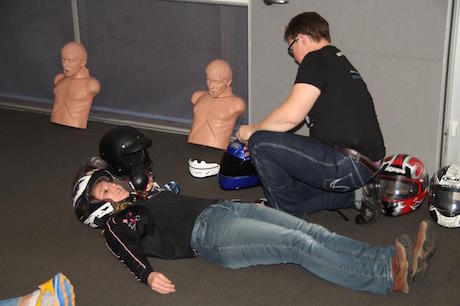
We have occasionally delivered courses outside Sydney but we are now truly ready to take our training nationwide. We have sold our house and bought a truck and a caravan and will initially be covering cities and regional centres in Queensland, New South Wales, ACT and Victoria starting on July 3. We are excited about finding a new way to live and having a strong sense of purpose as we aim to deliver this valuable training to 3000 people over the next two years or so.
Check the web site for course information, dates, locations and book online. The cost to attend is $78 per person. For Ulysses Club members the course qualifies for a 50% rebate. For more information, visit www.firstaidformotorcyclists.com.au or contact Tracy Hughes on 0408 956 435.


